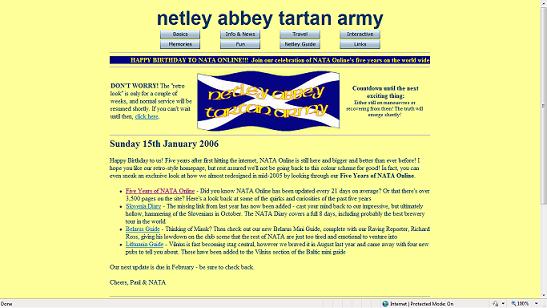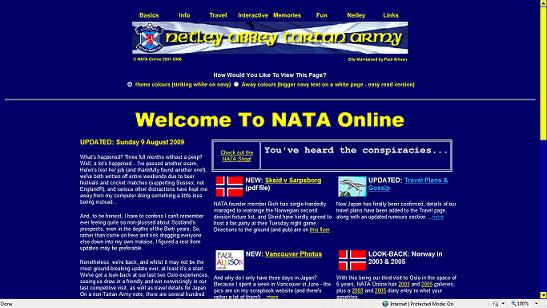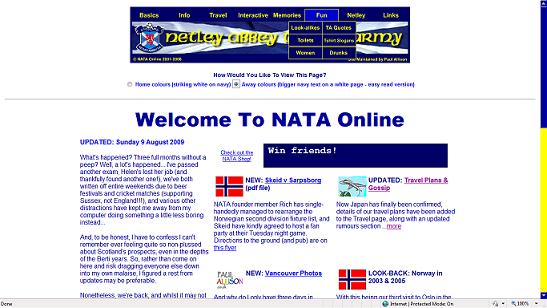| |
| From its initial insipid beginnings
in 2001, NATA Online grew organically (and, at times,
very rapidly) to become almost too big for its webmaster
to manage. In late 2009, the decision was taken to cut
back on quantity and get back to focussing upon providing
a quality online resource for Scotland fans.
This page explains the evolution
of the website, and looks at some of the features
that have now been discontinued (although many remain
online as part of the site archive).
|
Mark
#1: NATA Online Jan 2001-March 2003

|
| Inspired by the Notts Scots
early yahoo site, Paul became determined to get NATA
on the web as soon as he had a PC. After buying one
in the 2001 January sales, NATA first hit the internet
later that month with a very basic yellow homepage,
complete with retro navy blue Times New Roman text.
Unfortunately, no genuine
pages from the site’s original incarnation have
survived, however below is a screen-shot of the look
and feel of the site, taken from the 5th anniversary
tribute homepage.
The site had a pretty flat structure
in these days, with limited photos (for several reasons:
we hadn’t been on many trips; digital cameras
were not widespread, so printed photos were scanned
in; web space was restrictive) and several “fun”
features such as risqué song lyrics and a spoof
packing checklist.
After a few trial and error experiments,
Paul found a winning formula and continued to expand
by gradually adding to the diaries and scanning in
more photos. The very first diary accounts only ran
to a couple of paragraphs (and they’re still
there), but as more and more people gave encouraging
feedback, these grew into the mini-novels they are
today (3,000+ words for both Iceland and the Faroe
Islands). Likewise, the photographs have become more
numerous with the advent of accessible digital photography.
Back
to top |
Mark #2: NATA
Online March 2003-Dec 2009

|
In 2003, the site received an
overhaul that was to last for nearly the next 7 years.
The background became navy blue, the text became yellow
or white, and even the side scroll bars took on the
“corporate” look. This was augmented a
couple of months later with an “away”
colour scheme (below), allowing most visitors (dependent
on their browser) to view slightly larger navy text
on a white background. A few years later, the Scottish
Football Association adopted a similar gimmick for
their own website!
Back to top |
Mark #2.5:
NATA Online July 2003-Dec 2009 
|
| Along the way, as Paul and
his fellow NATA members expanded their travels, a number
of people (both friends and complete strangers who had
found the site via a search engine) were asking for
travel and pub tips to enhance their own city breaks
– Prague was amazingly popular. In response to
this, and to typing out the same email about Prague
pubs a dozen times, Paul decided to create a Travel
Guide section, and this has proved to be one of the
more popular areas of the site. The downside with this
is the speed with which information dates, particularly
for cities that have been visited only once or twice,
however the trick here is to remind the reader of this
fact and warn them that the information could well be
already out of date. The
streamlined 2010 version of the website has stripped
away the dark colours of its predecessor version and
has taken the colours of the NATA crest (itself only
designed in 2004) as its inspiration. An early draft
of the new design was roundly rejected by NATA members
in May 2005, but having become frustrated with the
effort to keep the mammoth site up-to-date and fit
for purpose, Paul decided to dust down the idea, bring
it up to date with a new navigation system (replacing
the mobile phone incompatible flash navigation bar)
and radically reduce the number of active pages. Other
features such as the site search, the countdown to
the next game and the newsletter have also been discontinued
(for now, anyway) as these all added to the time taken
to keep the site fully up-to-date.
So as to allow the previous
site’s ideas and content to not disappear into
the ether, the vast majority of the old pages have
remain accessible via the Web
Archive (although these have largely remained
in the Mark #2 format).
Back to top
|
| |
|
|